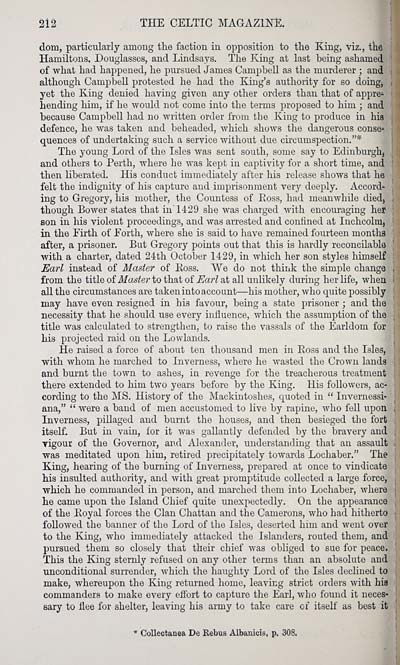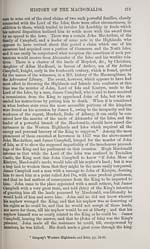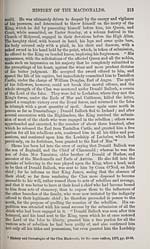Blair Collection > Celtic magazine > Volume 5
(222)
Download files
Complete book:
Individual page:
Thumbnail gallery: Grid view | List view

21^ THE CELTIC MAGAZINE. | ]
dom, particularly among the faction in opposition to the King, viz., thd ; |j
Hamiltoiis. Douglasses, and Lindsays. The King at last being ashamed ' ^
of what had hajjpened, he pursued James Campbell as the murderer ; and j s
although Campbell protested he had the King's authority for so doingj \ x
yet the King denied having given any other orders than that of appre- ; l
hending him, if he would not come into the terms proposed to him ; and i <i
because Campbell had no written order from the King to produce in hia \.\
defence, he was taken and beheaded, which shows the dangerous conse* i «
quences of undertaking such a service without due circumspection."* | ;
The young Lord of the Isles was sent south, some say to Edinburgh, j i]
and otliers to Perth, where he was kept in captivity for a short time, and I a
then liberated. His conduct immediately after his release shows that he j J
felt the indignity of his capture and imprisonment very deeply. Accord' | j(
ing to Gregory, his mother, the Countess of Eoss, had meanwhile died, i )1
though Bower states that in 1429 she was charged with encouraging he! 1 >.
son in his violent proceedings, and was arrested and confined at Inchcolm, ! r
in the Firth of Forth, where she is said to have remained fourteen montha ' I
after, a prisoner. But Gregory points out that this is hardly reconcilable } !■
with a charter, dated 24th October 1429, in which her son styles himself 1 1*
Earl instead of Master of Koss. We do not think the simple change i 5
from the title oi Master to that of Earl at all unlikely during her life, when i *
all the circumstances are taken into a ceo ant — his mother, who quite possibly
may have even resigned in his favour, being a state prisoner ; and the
necessity that he should use every influence, which the assumption of the
title was calculated to strengthen, to raise the vassals of the Earldom for
his projected raid on the Lowlands.
He raised a force of about ten thousand men in Eoss and the Isles,
with whom he marched to Inverness, where he wasted the Crown landa
and burnt the town to ashes, in revenge for the treacherous treatment
there extended to him two years before by the King. His followers, ac-
cording to the MS. History of the Mackintoshes, quoted in " Inverneasi-
ana," " were a band of men accustomed to live by rapine, who fell upon
Inverness, pillaged and burnt the houses, and then besieged the fort
itself. But in vaiir, for it was gallantly defended by the bravery and
rigour of the Governor, and Alexander, understanding that an assault
was meditated upon him, retired precipitately towards Lochaber." The
King, hearing of the burning of Inverness, prepared at once to vindicate
his insulted authority, and with great promptitude collected a large force,
which ho commanded in person, and marched them into Lochaber, where
he came upon the Island Chief quite unexpectedly. On the appearance
of the Eoyal forces the Clan Chattan and the Camerons, who had hitherto
followed the banner of the Lord of the Isles, deserted him and went over
to the King, who immediately attacked the Islanders, routed them, and
pursued them so closely that their chief was obliged to sue for peace.
This the King sternly refused on any other terms than an absolute and
unconditional surrender, which the liauglity Lord of the Isles declined to
make, whereupon the King returned home, leaving strict orders with hia
commanders to make every efibrt to capture the Earl, who found it neces-
sary to flee for shelter, leaving his army to take care of itself as best it
* Collectanea De Kebus Albanicis, p. 308.
dom, particularly among the faction in opposition to the King, viz., thd ; |j
Hamiltoiis. Douglasses, and Lindsays. The King at last being ashamed ' ^
of what had hajjpened, he pursued James Campbell as the murderer ; and j s
although Campbell protested he had the King's authority for so doingj \ x
yet the King denied having given any other orders than that of appre- ; l
hending him, if he would not come into the terms proposed to him ; and i <i
because Campbell had no written order from the King to produce in hia \.\
defence, he was taken and beheaded, which shows the dangerous conse* i «
quences of undertaking such a service without due circumspection."* | ;
The young Lord of the Isles was sent south, some say to Edinburgh, j i]
and otliers to Perth, where he was kept in captivity for a short time, and I a
then liberated. His conduct immediately after his release shows that he j J
felt the indignity of his capture and imprisonment very deeply. Accord' | j(
ing to Gregory, his mother, the Countess of Eoss, had meanwhile died, i )1
though Bower states that in 1429 she was charged with encouraging he! 1 >.
son in his violent proceedings, and was arrested and confined at Inchcolm, ! r
in the Firth of Forth, where she is said to have remained fourteen montha ' I
after, a prisoner. But Gregory points out that this is hardly reconcilable } !■
with a charter, dated 24th October 1429, in which her son styles himself 1 1*
Earl instead of Master of Koss. We do not think the simple change i 5
from the title oi Master to that of Earl at all unlikely during her life, when i *
all the circumstances are taken into a ceo ant — his mother, who quite possibly
may have even resigned in his favour, being a state prisoner ; and the
necessity that he should use every influence, which the assumption of the
title was calculated to strengthen, to raise the vassals of the Earldom for
his projected raid on the Lowlands.
He raised a force of about ten thousand men in Eoss and the Isles,
with whom he marched to Inverness, where he wasted the Crown landa
and burnt the town to ashes, in revenge for the treacherous treatment
there extended to him two years before by the King. His followers, ac-
cording to the MS. History of the Mackintoshes, quoted in " Inverneasi-
ana," " were a band of men accustomed to live by rapine, who fell upon
Inverness, pillaged and burnt the houses, and then besieged the fort
itself. But in vaiir, for it was gallantly defended by the bravery and
rigour of the Governor, and Alexander, understanding that an assault
was meditated upon him, retired precipitately towards Lochaber." The
King, hearing of the burning of Inverness, prepared at once to vindicate
his insulted authority, and with great promptitude collected a large force,
which ho commanded in person, and marched them into Lochaber, where
he came upon the Island Chief quite unexpectedly. On the appearance
of the Eoyal forces the Clan Chattan and the Camerons, who had hitherto
followed the banner of the Lord of the Isles, deserted him and went over
to the King, who immediately attacked the Islanders, routed them, and
pursued them so closely that their chief was obliged to sue for peace.
This the King sternly refused on any other terms than an absolute and
unconditional surrender, which the liauglity Lord of the Isles declined to
make, whereupon the King returned home, leaving strict orders with hia
commanders to make every efibrt to capture the Earl, who found it neces-
sary to flee for shelter, leaving his army to take care of itself as best it
* Collectanea De Kebus Albanicis, p. 308.
Set display mode to: Large image | Transcription
Images and transcriptions on this page, including medium image downloads, may be used under the Creative Commons Attribution 4.0 International Licence unless otherwise stated. ![]()
| Early Gaelic Book Collections > Blair Collection > Celtic magazine > Volume 5 > (222) |
|---|
| Permanent URL | https://digital.nls.uk/76451494 |
|---|
| Description | Volume V, 1880. |
|---|---|
| Shelfmark | Blair.6 |
| Attribution and copyright: |
|
| Description | A selection of books from a collection of more than 500 titles, mostly on religious and literary topics. Also includes some material dealing with other Celtic languages and societies. Collection created towards the end of the 19th century by Lady Evelyn Stewart Murray. |
|---|
| Description | Selected items from five 'Special and Named Printed Collections'. Includes books in Gaelic and other Celtic languages, works about the Gaels, their languages, literature, culture and history. |
|---|

